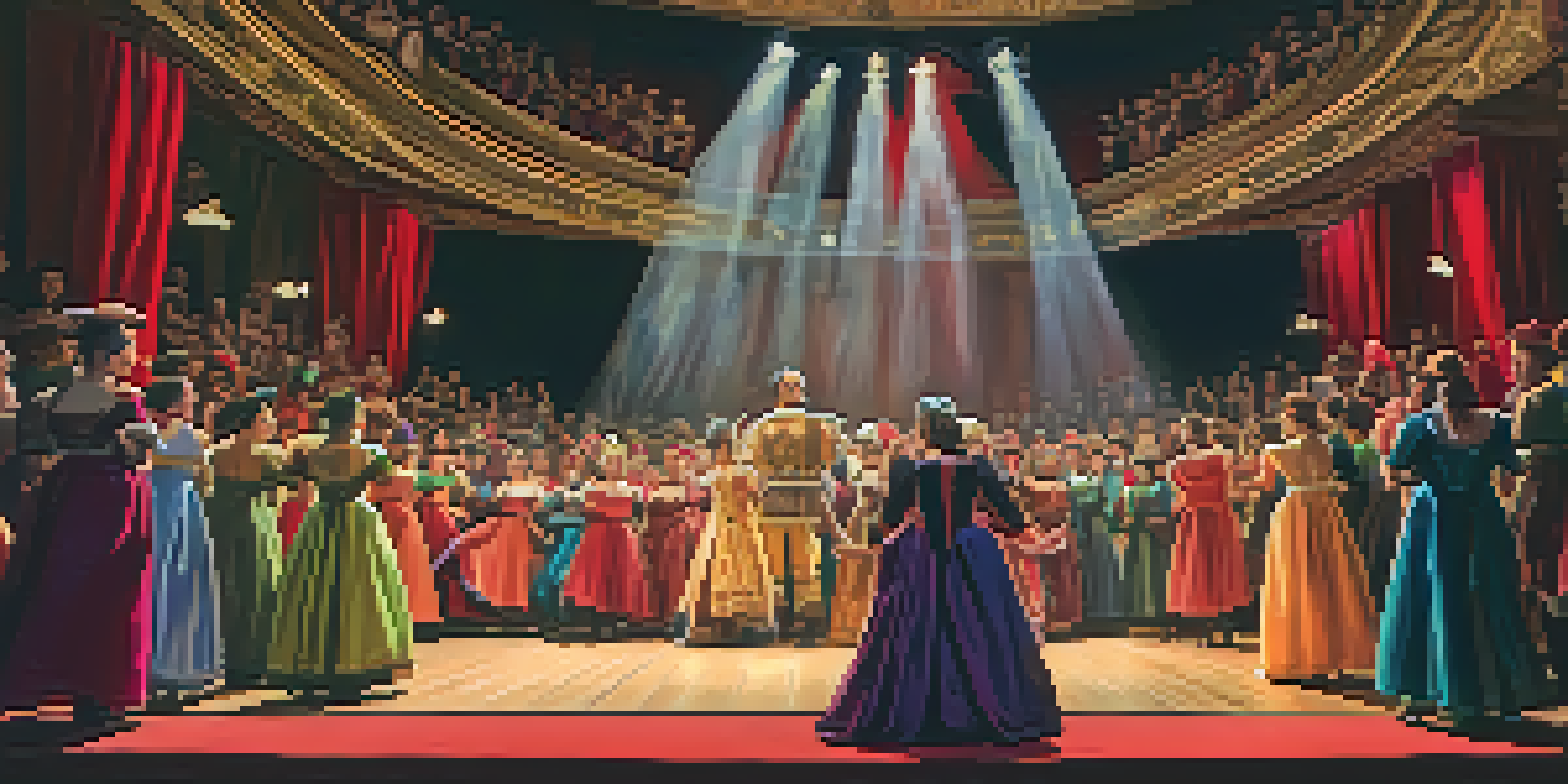The Role of Imagination in Acting: Techniques for Creativity

Understanding the Role of Imagination in Acting
Imagination is the heartbeat of acting, breathing life into characters and stories. It allows actors to step into another person's shoes, experiencing emotions and situations far removed from their own reality. By tapping into their imagination, actors can create authentic performances that resonate with audiences.
Imagination is the highest kite one can fly.
This imaginative process is not just about pretending; it's about fully embodying a character's essence. When actors unleash their imagination, they can transform mundane lines into powerful expressions of human experience. Every performance becomes an opportunity to explore diverse perspectives, fostering empathy and connection.
Ultimately, imagination empowers actors to push boundaries and experiment with their craft. It invites them to take risks, explore the depths of their creativity, and discover new dimensions of their characters. This imaginative journey is what keeps acting fresh and engaging, both for the performer and the audience.
Techniques to Enhance Imagination in Acting
There are various techniques actors can employ to enhance their imaginative capabilities. One popular method is improvisation, which encourages spontaneity and creative thinking. By embracing the unpredictable nature of improv, actors learn to trust their instincts and think on their feet, cultivating a more vibrant imagination.

Another effective technique is visualization, where actors mentally picture the scenarios their characters are involved in. This practice helps actors create a vivid mental landscape, enriching their performances with more detail and depth. Visualization allows them to immerse themselves in the character's world, making their reactions more authentic.
Imagination Fuels Authentic Acting
Imagination enables actors to deeply connect with their characters, allowing for performances that resonate emotionally with audiences.
Finally, engaging in physical movement can also spark imagination. By allowing their bodies to express emotions through dance or movement exercises, actors can unlock deeper layers of creativity. This physicality can inspire new ideas and interpretations, leading to more dynamic and compelling performances.
Using Emotional Memory to Fuel Imagination
Emotional memory is a powerful tool that actors can use to enhance their imaginative process. It involves recalling personal experiences and emotions to connect with a character’s feelings. By accessing these memories, actors can bring genuine emotion to their performances, making them relatable and impactful.
Acting is not about being someone different. It’s finding the similarity in what is apparently different, then finding myself in there.
For example, if a character is experiencing heartbreak, an actor might draw from their own experiences of loss. This connection can lead to a more authentic portrayal, as the actor navigates the character’s emotions with real depth. Emotional memory allows for a bridge between the actor's life and the character's journey.
However, it’s essential for actors to balance emotional memory with their imaginative skills. While drawing on personal experiences can be powerful, relying solely on them may limit creativity. The best performances often come from a blend of imagination and emotional authenticity, creating a richer experience for both the actor and the audience.
The Importance of Playfulness in Acting
Playfulness is often overlooked but is crucial for nurturing imagination in acting. When actors approach their craft with a sense of fun and curiosity, they open themselves up to new ideas and possibilities. This playful attitude can lead to unexpected discoveries in character development and scene work.
Engaging in playful exercises, such as games or improvisational activities, can help actors break free from rigid thinking. These activities encourage spontaneity, allowing actors to explore different facets of their characters in a safe and supportive environment. Playfulness fosters a sense of freedom, enabling actors to experiment without fear of judgment.
Collaboration Enhances Creativity
Working with others in the acting process fosters a dynamic exchange of ideas that enriches imaginative exploration and character portrayal.
Moreover, a playful mindset can alleviate the pressure often associated with performances. When actors approach their work with joy and lightness, it can enhance their creativity and lead to more authentic portrayals. Ultimately, playfulness cultivates a deeper connection to the imaginative process, enriching the overall acting experience.
Incorporating Sensory Exploration into Acting
Sensory exploration is a technique that encourages actors to engage their senses to enhance their imaginative capabilities. By focusing on sight, sound, touch, taste, and smell, actors can create a more immersive experience for themselves and their audience. This sensory engagement helps bring their characters' worlds to life.
For instance, before stepping into a character’s shoes, an actor might visualize the environment, imagining the smells, sounds, and textures. This process can ground their performance in reality, making their reactions more believable. The audience can sense this authenticity, resulting in a more engaging experience.
Additionally, sensory exercises can foster deeper emotional connections to the character’s experiences. By fully immersing themselves in the sensory aspects of a scene, actors can evoke real emotions, enriching their performance. Sensory exploration provides another layer of imagination and creativity that can elevate any acting performance.
The Role of Collaboration in Fostering Imagination
Collaboration is a vital component of the acting process that significantly enhances imagination. Working closely with fellow actors, directors, and writers can lead to a richer exchange of ideas and perspectives. This collaborative spirit encourages actors to think outside the box and explore their creativity in new ways.
In rehearsals, sharing interpretations and insights can spark fresh ideas and inspire innovative approaches to scenes. Each actor brings their unique experiences and imagination to the table, creating a dynamic environment where creativity can flourish. This teamwork fosters a supportive atmosphere that nurtures imaginative exploration.
Playfulness Sparks Imaginative Growth
A playful approach to acting encourages spontaneity and creativity, leading to unexpected discoveries in character development and performance.
Furthermore, collaboration extends beyond the rehearsal space; it also involves engaging with the audience. Understanding how an audience reacts can inspire actors to adapt their performances, which in turn can ignite further imaginative thinking. This ongoing dialogue between performers and spectators helps cultivate a vibrant theatrical experience.
The Impact of Imagination on Character Development
Imagination plays a pivotal role in character development, allowing actors to create compelling and multi-dimensional characters. By envisioning a character's backstory, motivations, and relationships, actors can breathe life into their roles. This imaginative process is essential for crafting authentic performances that resonate with audiences.
For example, an actor might imagine their character’s childhood experiences to understand their current behavior and choices. This deep dive into the character’s psyche allows actors to portray them with depth and nuance, making their performances more engaging. The audience is drawn into the story, captivated by the authenticity of the characters.

Moreover, imagination enables actors to explore the transformation of their characters throughout the narrative. By envisioning how a character evolves, actors can create a more dynamic portrayal, reflecting growth, change, and complexity. Ultimately, this imaginative investment in character development elevates the overall quality of the performance.